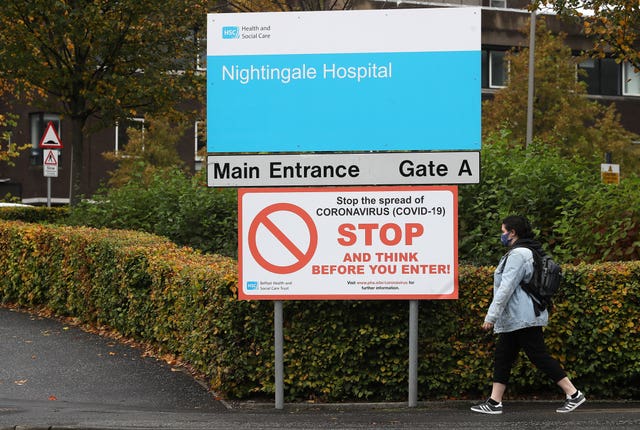Covid had more impact on health services in NI, Swann tells inquiry
Robin Swann was Stormont’s health minister during the pandemic.

Disruption to hospital treatment caused by Covid-19 in Northern Ireland was greater than the rest of the UK because of the already strained state of its health service, former health minister Robin Swann has said.
He was asked at the UK Covid-19 Inquiry whether his decision in 2020 to site Northern Ireland’s Covid Nightingale hospital in the tower block at Belfast City Hospital (BCH) meant facilities were not available for cancer care.
Mr Swann, who was Northern Ireland’s health minister during the pandemic, told the inquiry the hospital was not the preferred site for the Nightingale unit, but logistics prevented the facility being placed at a non-hospital site.
Counsel Nick Scott asked the former minister about the creation of the Nightingale facility in April 2020, when a unit to deal specifically with critically ill Covid patients was created.
Mr Scott showed a Department of Health briefing paper which said a number of non-hospital sites had been explored, including the Eikon Exhibition Centre near Lisburn, the Titanic Exhibition Centre and Belfast Harbour Studios.
The document said the Eikon centre was considered the most suitable option, but it was not progressed due to the amount of work which would have been required to transform it into a medical facility.
The barrister asked: “That is the reason why the Nightingale ended up in the Belfast City Hospital tower, fundamentally because the preferred option could not be made ready in time?”
Mr Swann replied: “That is correct.”

Mr Swann said: “The work that would have had to be done to make oxygen available, to make all the proper medical necessities available for critical care beds, the Eikon centre would have taken an inordinate amount of work to bring it up to status because it is a large exhibition centre, a warehouse, rather than the facilities which would become available by the adaptations of the tower block in the City Hospital.”
Mr Scott asked if the Eikon centre could have been used if planning had begun earlier.
Mr Swann said: “In a roundabout way I could agree, but there’s a difference between planning to make those changes and actually putting physical site works in place that would have allowed us to put ICU beds into that facility.”
The barrister said: “Effectively the Belfast City Hospital tower was not the preferred option, you would have preferred it to be elsewhere?”

Mr Scott pointed out that siting the Nightingale at the BCH meant “you were putting it in the middle of the Regional Cancer Centre”.
He added: “What were the consequences for infection prevention for those people who were suffering from cancer who were visiting the BCH while having the Nightingale in the middle of the tower?”
Mr Swann said: “It was on different floors so there was that segregation between the provision of additional services that were within the tower as well as being able to adapt those floors that were being used for the Nightingale.”
Mr Scott asked if there had been an impact on the ability to provide cancer care because facilities were being used for the Nightingale.
“But in regards to be able to complement the additionality in regards to critical care, referring back to the point of the availability and the services of staff, that was something we did not have in Northern Ireland at that point.”
Mr Scott continued: “If you hadn’t put the Nightingale in the middle of the BCH tower, you could, had you chosen to do so, have continued to use those facilities to provide cancer care, is that not right?”
Mr Swann said: “It wasn’t that we had to stop cancer treatments in regards to supply the additional critical care beds, it was the fact that some of those treatments and supports were displaced elsewhere.
“Going back to the operational decision of the trusts, we had to step down services that we didn’t wish we had to in regards to what we had to do to support the Covid delivery of supporting patients.
“I think it was something that was more impacted in Northern Ireland due to the status and the state that the health service actually went into prior to Covid.”





